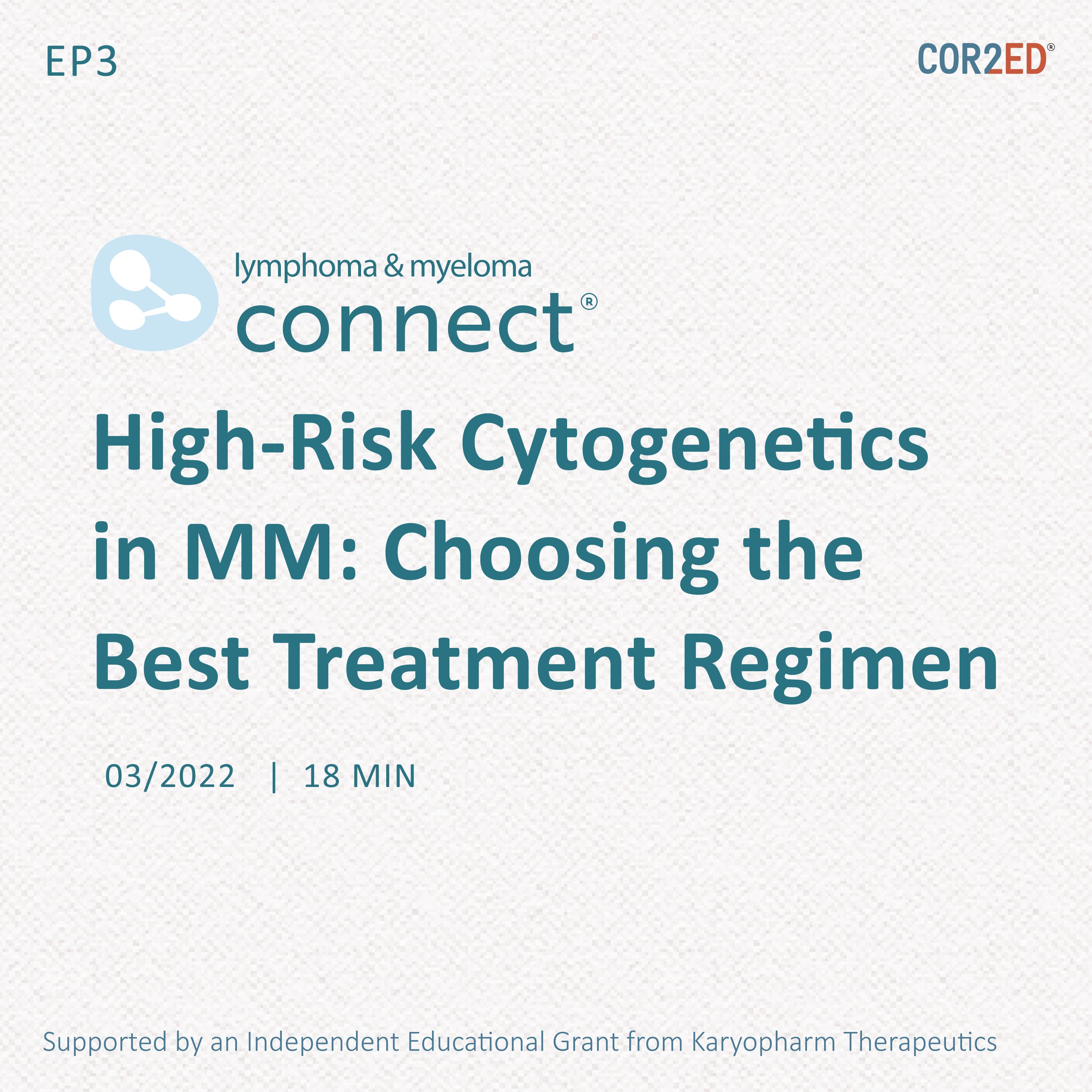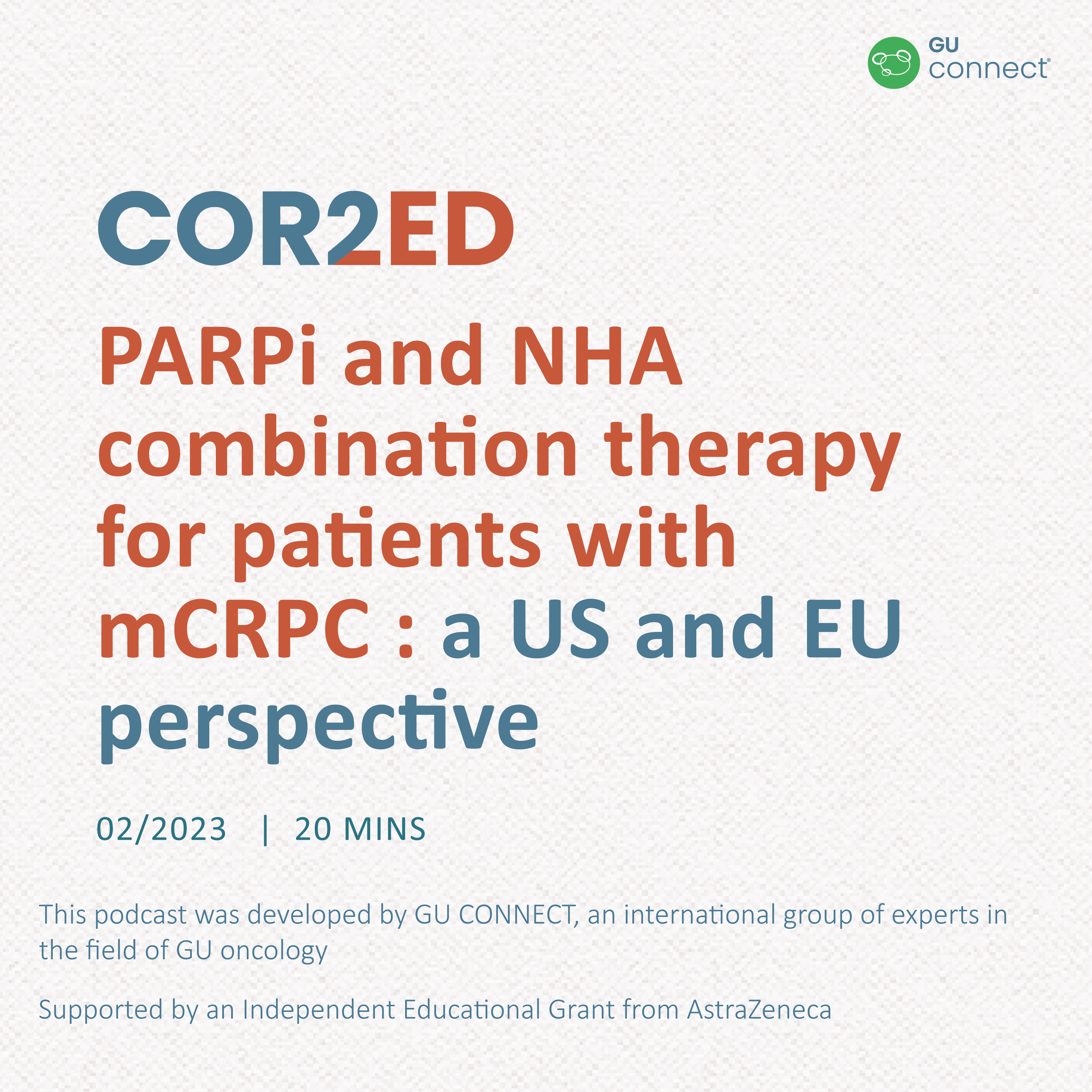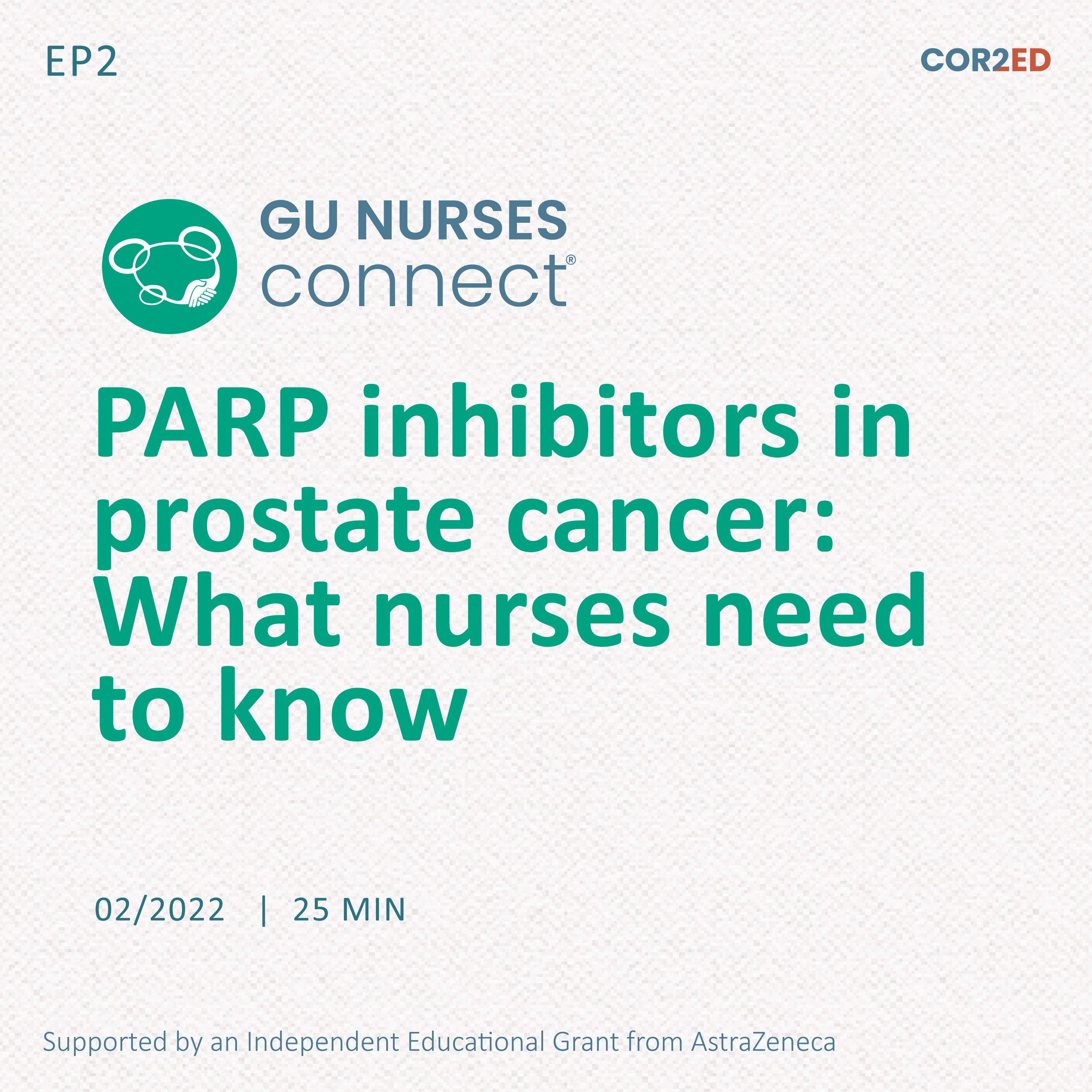Episode Transcript
Treatment Intensification In Metastatic Castration Sensitive Prostate Cancer - The Nurse Perspective
Tonke De Jong
Hello and welcome to this podcast covering treatment intensification in metastatic castration sensitive prostate cancer - the nurse perspective. I'm Tonke De Jong and I'll be moderating today's podcast for COR2ED Medical Education.
This podcast is an initiative of COR2ED and developed by GU NURSES CONNECT, a group of international nurse experts working in the field of GU oncology. The podcast is supported by an Independent Educational Grant from Bayer. The views expressed are the personal opinions of the experts. They do not necessarily represent the views of the experts' organisations or the rest of the GU NURSES CONNECT Group. For expert disclosures on any conflict of interest, please visit the COR2ED website.
I'm happy to welcome today our two GU NURSE CONNECT experts. Let's start with some introductions and perhaps you could go first Brenda?
Brenda Martone
Of course. My name is Brenda Martone and I'm a nurse practitioner at Northwestern Medicine in Chicago. I work in GU oncology outpatient and see mostly patients with prostate and bladder cancer.
Tonke De Jong
Thank you, Brenda. And I'm also delighted to welcome Jennifer Sutton to join us.
Jennifer Sutton
Thanks. I'm delighted to join you both. I'm Jennifer Sutton, the director of nursing and administration at Carolina Urologic Research Center in Myrtle Beach, South Carolina. We conduct phase I through 4 clinical trials in all areas of urology, including advanced prostate cancer.
Tonke De Jong
Thank you, Jennifer. So given your different nurse roles, it's great that you will both be bringing different perspectives to this podcast. Over recent years, we've seen treatment intensification for metastatic CSPC patients evolve from ADT plus docetaxel to ADT plus novel hormonal agents such as apalutamide, enzalutamide and abiraterone, and over the past couple of years, we have seen treatment intensification go a step further with triplet therapy consisting of ADT, docetaxel and novel hormonal agents in the PEACE-1 and ARASENS trials.
The NCCN and ESMO guidelines have now been updated to include treatment intensification with triplet therapy following the ARASENS trial. And this has also led to an indication for darolutamide in combination with docetaxel in metastatic CSPC patients from both the FDA and EMA. So perhaps a good place to start would be with a short overview of the ARASENS study. Brenda?
Brenda Martone
The ARASENS was a global randomised, double blind, placebo-controlled phase 3 trial. Patients with metastatic hormone sensitive prostate cancer, also known as castration sensitive prostate cancer, were randomised to darolutamide 600 milligrams twice daily or placebo, and both received androgen deprivation therapy and six cycles of docetaxel. The primary endpoint was overall survival, and those in the triplet arm saw a 32.5% relative improvement in overall survival .
The overall survival benefits were observed in patients with synchronous or metachronous mets. There seemed to be a greater benefit in patients with bone mets versus visceral. But there was still a benefit for those who had visceral mets. Patients with non-regional lymph nodes appeared to have a limited benefit. This overall survival benefit was observed in patients, irrespective of risk and volume, although patients with high volume had a greater degree of benefit. And we also saw benefit of overall survival when looking at alkaline phosphatase subgroups.
So the addition of darolutamide to ADT and docetaxel did not result in more AEs and this is supported by the following evidence. 85% of patients completed six cycles of docetaxel in both treatment groups. The rate of AES leading to docetaxel dose reduction or discontinuation were similar in both groups and the benefits were overall balanced with the potential risks in the treatment therapy arm. All incidence AEs were similarly reported between both groups. Serious adverse events were a little higher during the docetaxel and also a little higher in the triplet therapy group rather than the single or the double group, at 44 and 42%. Incidences of the most common AEs and toxicities were known toxicities of docetaxel and were highest during the docetaxel treatment period for both arms, but progressively decreased after completion of docetaxel.
Tonke De Jong
Great. Thanks for that overview of the ARASENS trial Brenda. I know that you've recently also presented a poster at the ONS conference, right?
Brenda Martone
I did.
Tonke De Jong
Nice. Very interesting. And I was wondering if you could tell us more what came out of that poster of your poster presentation and also what type of discussions you had about your data?
Brenda Martone
It was really interesting. So this was like an additional analysis of adverse events and between the triplet arm and the doublet. And interestingly, the incidence of adverse events were not very different between the triplet and the doublet. So it was well tolerated, and this is important for nurses and patients to know because treatment needs to be tolerated, side effects need to be managed so they can remain on therapy and get the potential benefit that the triplet therapy allows.
Tonke De Jong
Yeah. So the triplet therapy, like the main conclusion was that it was well tolerated?
Brenda Martone
Correct. It was well tolerated with really side effect profiles that were matching between either triplet or doublet.
Tonke De Jong
Thanks Brenda. Now, Jennifer, can we ask you to give a high-level summary of the other key trial, which is PEACE-1?
Jennifer Sutton
Absolutely. In the PEACE-1 study patients with de novo metastatic prostate cancer were randomised to receive standard of care with or without abiraterone acetate. The data was stratified for docetaxel use and 60% of patients received docetaxel as part of standard of care. The primary endpoint was progression free survival, but 25% relative improvement in overall survival was seen for patients receiving docetaxel.
Radiographic progression free survival benefit was seen regardless of disease burden and were observed in both high and low volume. In men 70 years or older and fit enough to receive ADT plus docetaxel, the benefit of adding abiraterone acetate plus prednisone to standard of care was comparable to men less than 70 years old. Safety data revealed grade 3 to 5 liver function abnormalities and hypertension were higher in patients who received standard of care plus abiraterone acetate with prednisone compared to standard of care alone.
Tonke De Jong
Thanks, Jennifer, for taking us through that. So two robust studies supporting treatment intensification with a triplet therapy. Brenda, as a nurse practitioner, you are involved in treatment decisions with the patient and the physician. Based on the data from ARASENS and PEACE-1, should triplet therapy be standard of care for all metastatic CSPC patients now, or do you think are there only certain patients that you would consider for this treatment intensification? And also, what type of things are you considering when assessing a patient?
Brenda Martone
I believe triplet therapy should be the new standard of care in all patients who are chemo fit with high volume and high-risk disease. I think looking at the ARASENS study, most of the patients who are enrolled had metastatic disease with bone, visceral or both at the time of initial diagnosis. So, we know that there's limited data in patients who have metastatic disease and a better overall prognosis. In addition, we know the safety and efficacy of the combination therapy are unknown in patients with a poor performance status because the trial only included patients with an ECOG 01. So of course, focusing on, is your patient chemo fit?
Jennifer kind of mentioned a little bit about PEACE-1 and adding ABI (abiraterone)/PRED (prednisone) and in older and younger patients and she highlighted that in older men who are not fit enough to receive ADT and docetaxel, the benefit of adding ABI/PRED to standard of care was comparable to younger men. So, in men who are older than 70 and consider treatment and chemotherapy fit should be considered for triplet therapy. And the recommendations are for careful evaluation of these gentleman. Maybe a geriatric assessment prior to starting therapy. Consideration in both treatment of PEACE-1 and ARASENS looking at patient’s comorbidities, the risk of polypharmacy and potential drug-drug interactions and again close monitoring and management of side effects to ensure the beneficial outcome and the improved quality of life.
Tonke De Jong
Yes, I understand. So if you would summarise your considerations on giving treatment intensification for metastatic CSPC patients, which patients would you consider?
Brenda Martone
I would definitely consider those patients with high volume, high risk, metastatic castration sensitive prostate cancer who are chemo fit. We have the data to show us that treatment tolerability was similar, without the addition of significant adverse events.
Tonke De Jong
Great. That's clear. Thanks Brenda. So we've heard how nurse practitioners have an important role in treatment decisions alongside the patient and the physician. Jennifer, what other roles does the nurse have in supporting metastatic CSPC patients with treatment intensification.
Jennifer Sutton
Great question. Oncology nurses educate and counsel patients to help them understand their treatment options and then associated safety profiles for optimal patient outcomes and successful disease management. Adverse event management is key to the patient staying on optimal treatment. Nurses encourage patients to share changes from baseline at each visit and offer emotional support to patients and their caregivers.
Tonke De Jong
So how do you give this emotional support Jennifer?
Jennifer Sutton
It's truly just listening. It's just being there for the patients and encouraging them to say how they're feeling, which doesn't come naturally to patients like this in this population. Encouraging them to really share what's going on with their treatment and also encouraging them to bring their caregiver because you can get a lot of information from caregivers when sometimes the patient is just saying they're feeling fine. You can really find out a lot from the caregivers. We also help coordination of care by navigating patients through the treatment process with treatment monitoring, adverse event management and necessary referrals to other doctors as needed.
Tonke De Jong
Yes. So as you point out, adverse event management is key and it's really important to explain to the patient what they can expect when they start treatment and the importance of early reporting of those side effects. Can you tell us the main side effects that you would usually highlight to the patient and the advice you give around their management?
Jennifer Sutton
Sure. We educate patients to stick to their clinic visit schedule so we can manage any lab abnormalities that may arise, such as low white blood cells, low neutrophils, low platelets, and any changes in kidney and liver functions. The clinic visit schedule is busier while patient is receiving chemotherapy and becomes less frequent after chemotherapy is completed. But it is essential that patients keep their clinic appointments after chemo is completed, even if feeling well, so we can collect lab values, monitor hypertension and assess for chance of rash.
We explain that fatigue is a common adverse event and to perform at least one activity each day to avoid staying in bed or on the couch all day. We inform them to stay hydrated and to eat a heart healthy diet. It is also important to explain to the patient that chemotherapy is just a small part of their treatment schedule compared to how long the patient will be on the androgen receptor inhibitor and the way they feel on chemo will resolve after chemo is completed.
Treating patients in this stage as castrate sensitive is important as they feel the best and are able to tolerate chemotherapy better earlier in their treatment journey. In regards to the androgen receptor inhibitors, GI adverse events are possible due to the oral route. It's important to educate patients that prednisone must be taken with food and abiraterone should be taken on an empty stomach. So we advise patients to take their abiraterone acetate when they wake up, wait an hour to eat breakfast and take their prednisone with breakfast. Darolutamide can be taken with or without food, so it's really up to patient preference. If they have GI upset when taking darolutamide then they should take it with a meal. It's important to note that the addition of abiraterone or darolutamide to ADT and docetaxel significantly improved radiographic progression free survival in de novo metastatic castration sensitive prostate cancer without adding significant short-term toxicity.
Tonke De Jong
That's clear Jennifer. Brenda, is there anything that you would like to add about symptom management?
Brenda Martone
Jennifer did a great job and I really appreciate that overview, I think it was very comprehensive. Just reminding patients, again what to expect so they can mitigate or we can like manage their expectations that they are going to feel potentially worse during the docetaxel, as Jennifer mentioned, but this is limited. With the oral androgen receptor inhibitors, great advice about dosing and how to take the medications if they are suffering from GI distress, making sure patients have antiemetics at home to use as needed. If they do start having any diarrhoea, a low fibre diet, perhaps oral anti diarrheal agents, maintaining good hydration. Constipation is often common just related to the docetaxel and also antiemetics can also cause constipation. So, if they notice an increase in constipation around each docetaxel infusion, then you can offer or suggest stool softeners, a high fibre diet, good oral hydration to help manage those side effects.
Tonke De Jong
So, Jennifer, I'm wondering, what are some of the most common concerns that you hear from patients when you are discussing on starting a treatment?
Jennifer Sutton
Well, first of all, patients, they're afraid of chemotherapy and just everything that word brings because it's a buzz word in all cancers. But it's important to understand that there's different types of chemotherapy. And so we review docetaxel and the schedule and then they get concerned about the schedule so we make sure that that the scheduling of their treatment will revolve around their time and we make it as convenient as possible for them.
Of course, they're concerned that their hair will fall out, which is a possible side effect. But we also just reassure them that when the chemo is finished that their adverse events related to the chemo should also resolve and the hair should grow back.
Tonke De Jong
Yes, I understand. Thanks, Jennifer. And Brenda, what about the drug-to-drug interactions?
Brenda Martone
Well, it's important to see what patients are already taking and really do a good drug-to-drug interaction investigation. In general, with abiraterone and prednisone, because the prednisone has to go with the abiraterone, you may want to consider maybe in a patient with poorly controlled diabetes, this may not be the best option for them. Another thing to think about is poorly controlled hypertension with the abiraterone, which can increase hypertension.
In general for drug interactions the most common medications that would interfere with abiraterone would be antiseizure medications and St John's Wort, and there may be some other medications with drug-drug interactions but again, this is why it's important to see if it's a mild or moderate interaction, because treatment can still be given based on the drug-drug interaction and if it's mild, then doses just need to be adjusted.
In general, darolutamide is a pretty ‘clean’ second generation AR inhibitor in terms of very limited drug-drug interactions. It may increase the potential side effects of atorvastatin, but there is no drug-drug interaction risk rosuvastatin so if a substitution can be made, this is often what is recommended and coordinated with the primary care doctor.
Tonke De Jong
Well, thank you both for a really great discussion and for sharing your insights and experiences. Before we wrap up, perhaps I could ask you both to give a couple of take-home messages for our listeners?
Brenda Martone
Yes, I'd be happy to. Triplet therapy should be the new standard of care for high-risk, high-volume, metastatic castration sensitive prostate cancer patients who are fit for chemotherapy. We know that early treatment intensification for these patients is most effective while they are still well enough to tolerate intensive treatment. It is also important to consider patient's co-morbidities, their risk profile, potential drug-drug interactions when determining which triplet regimen would be the most appropriate for your patient.
Tonke De Jong
And Jennifer, do you have anything to add?
Jennifer Sutton
Yes, I do. The nurse has a key role communicating to the patients the benefits and risks of different triplet regimens. Patient education on potential side effects and early reporting of them is essential to optimise patient outcomes.
Tonke De Jong
Well, thank you very much Brenda and Jennifer, for sharing your insights on the nurse's role in treatment intensification for metastatic CSPC patients. It's been a very informative discussion and I've learned a lot from you.
We hope you also found this podcast informative and enjoyable. If you like this episode, you should look on the COR2ED channel for more. Also, don't forget to rate this episode on the COR2ED website and share our podcast on social media or with your colleagues. Thank you for listening and see you next time.
This podcast was brought to you by COR2ED Independent Medical Education. Please visit cor2ed.com for more information.


